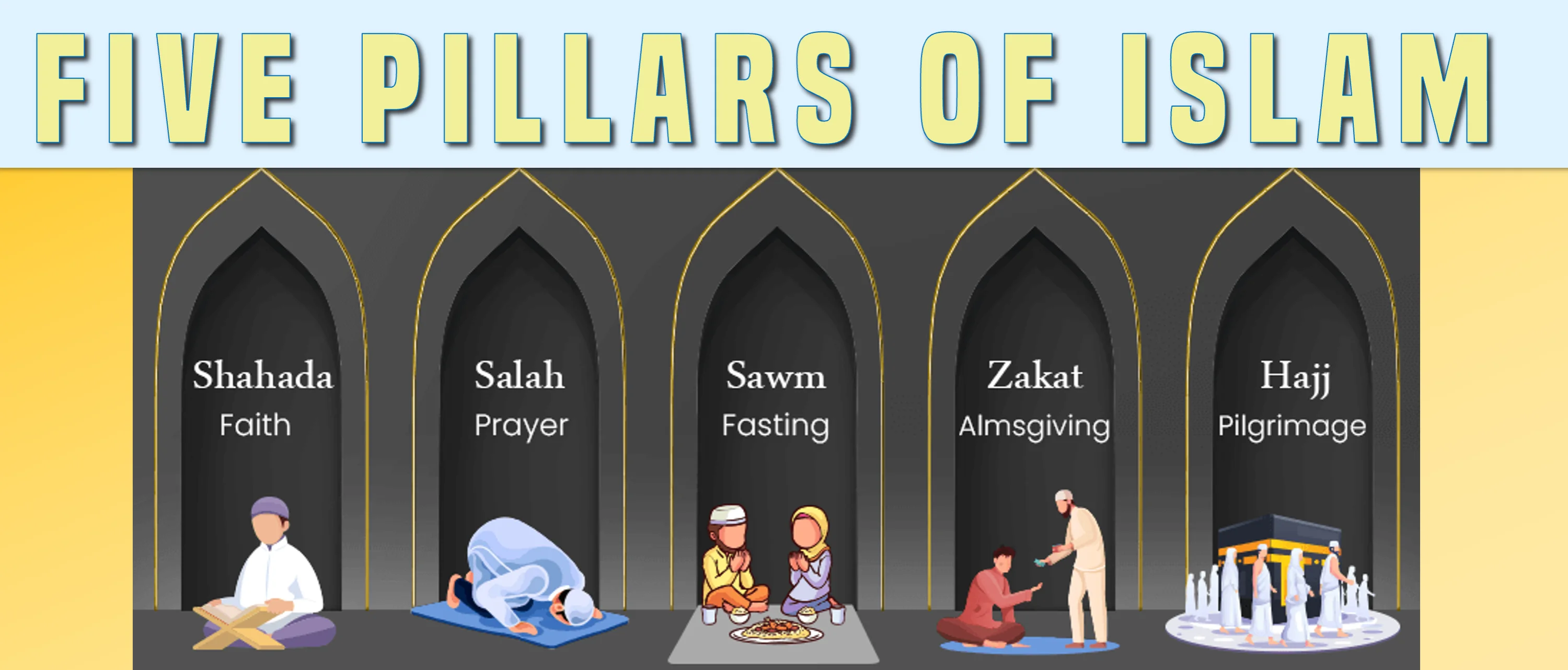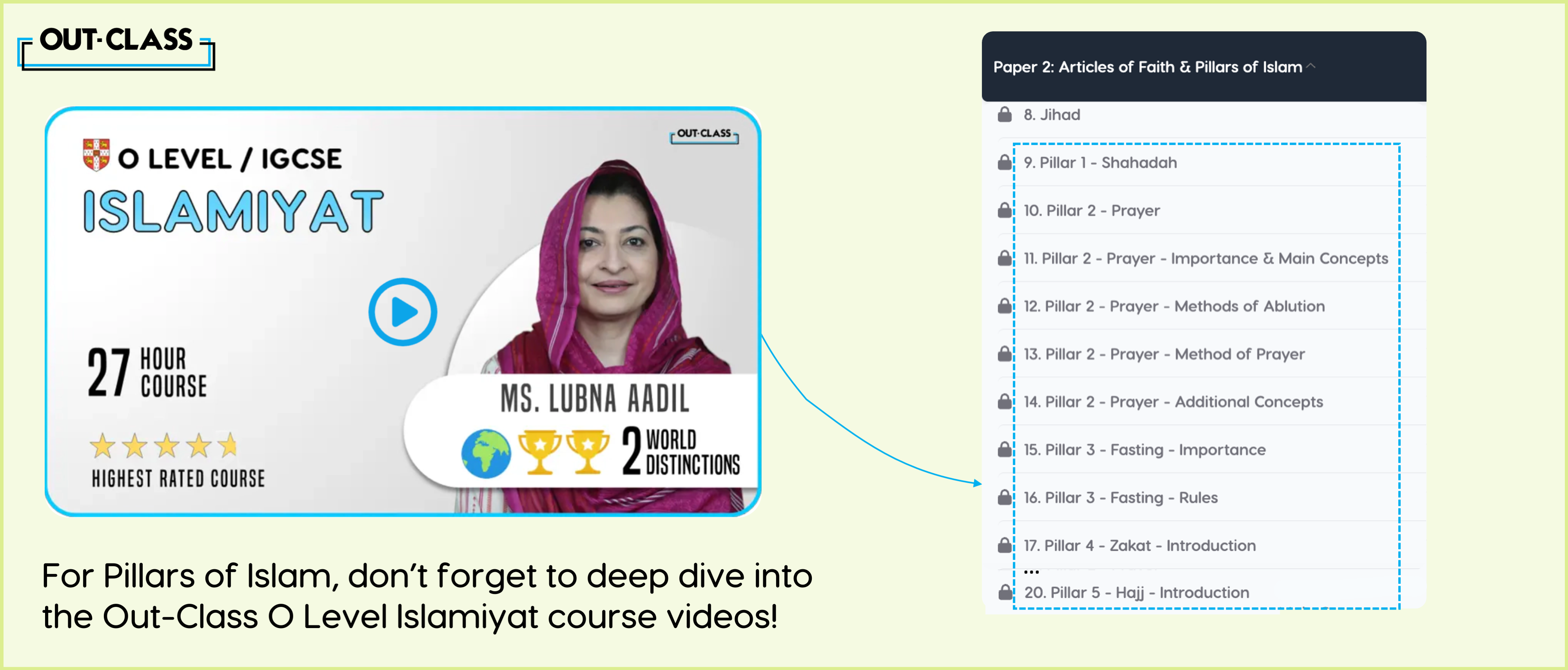Confused about what which IGCSE or O Level Islamiyat topic comes under the Articles of Faith and what comes under the Pillar of Islam? In this journey, we will vividly describe the five pillars of Islam, shedding light on their profound importance and meaning. If you've ever wondered, "What are the Five Pillars of Islam?" and "Why are the Five Pillars of Islam important?" — this blog is your ultimate O Level Islamiyat guide. Let's embark on this quest together, demystifying the pillars that shape the lives of millions.
What are the Five Pillars of Islam?
Let's expand more on these!
The Five Pillars of Islam
Shahada - Declaring the Oneness of God
At the core of the Islamic faith lies Shahada, a declaration affirming the Oneness of God and the prophethood of Muhammad. This pillar serves as the bedrock of the Muslim belief system, shaping every aspect of their lives. By understanding the five pillars of Islam and their meaning, we acknowledge Shahada as the fundamental creed that unites Muslims worldwide.
Salah - Establishing the Ritual Prayer
When we describe the five pillars of Islam, Salah stands out as the second pillar, emphasizing the significance of ritual prayers. Muslims engage in Salah five times daily, fostering a direct connection with Allah. This disciplined practice is a testament to the importance of regular spiritual engagement in a Muslim's daily life.
Zakat - Giving to Those in Need
Addressing the question of "what are the five pillars of Islam," Zakat emerges as a crucial pillar highlighting the importance of charity and social responsibility. By giving to those in need, Muslims actively contribute to societal well-being, embodying the values of empathy and generosity instilled by Islam. The act of Zakat goes beyond charity; it is an essential aspect of economic equity and justice.
Sawm - Observing Fasting During Ramadan
Sawm, the fourth pillar, involves the act of fasting during the holy month of Ramadan. By understanding "why are the five pillars of Islam important," we appreciate Sawm as a practice that extends beyond physical restraint. Fasting encourages self-reflection, gratitude, and heightened spiritual awareness symbolizing a commitment to personal growth and a deeper connection with Allah.
Hajj - The Pilgrimage to Mecca
Finally, we arrive at Hajj, the fifth pillar and the pinnacle of the Muslim journey. Hajj represents the ultimate expression of devotion, humility, and submission to God. This pilgrimage to Mecca is a unified force transcending geographical and cultural boundaries. Understanding Hajj is the key to comprehending the true significance of the five pillars of Islam and their meaning.
Why Are the Five Pillars of Islam Important?
The significance of the Five Pillars of Islam extends beyond religious obligations; they form the very foundation of a Muslim's identity and purpose. These pillars provide a roadmap for spiritual, moral, and social development, fostering a sense of unity among Muslims worldwide. By actively engaging in Shahada, Salah, Zakat, Sawm, and Hajj, individuals reaffirm their commitment to the principles that guide their lives, ensuring a harmonious integration of faith into every aspect of their existence. The Five Pillars not only fulfil religious duties but also serve as a profound source of personal growth, community welfare, and a deep connection with the divine.
Conclusion
In conclusion, the Five Pillars of Islam encapsulate the essence of the Islamic faith. By exploring each pillar and addressing key IGCSE & O Level Islamiyat questions such as "What are the five pillars of Islam" and "Why are the five pillars of Islam important," we gain a holistic understanding of the principles that guide the lives of millions. The pillars serve as a spiritual and moral development roadmap, fostering unity and shared commitment among the global Muslim community.
For more details on the Pillars of Islam, deep dive into the Out-Class O Level & IGCSE Islamiyat Crash Course Videos!
Most Common Repeated Questions:
Unlock the secrets to acing your CAIE IGCSE and O Level exams with a sneak peek into the most frequently asked questions that have graced the pages of O Level Islamiyat past papers!
-
a) Describe the particular features of congregational prayers on Fridays (jum‘a).
b) Why do Muslims regard these prayers as important? [Oct/Nov 2009, 2014, 2015, 2016] [May/June 2014, 2018] [Specimen 2009, 2012] - a) Describe the main events of the annual pilgrimage (hajj).
b)Explain the significance of the prophet Abraham in the observances of the pilgrimage. [Oct/Nov 2009, May/June 2013, 2014] - a) Give brief descriptions of the ways in which fasting and almsgiving are carried out.
b) Show how the observance of these two pillars keeps the community together. [Specimen 2009, 2012] [Oct/Nov 2011, May/June 2012, 2015] - Explain the main differences between hajj and umra [May/June 2011, 2016]
- a) Give a detailed account of how Muslims prepare for prayer.
b) ‘A mosque is a focal point in the lives of Muslims.’ Discuss. [May/June 2012, 2016] - a) Outline the features of the Ramadan fast, and identify which Muslims are exempt from fasting during this month.
b) What advantages does the fast of Ramadan bring to the Muslim community? [May/June 2012, 2019] [Oct/Nov 2014, 2016] - b) Who do you think benefits more from the payment of zakat and why, the giver or the receiver? [Oct/Nov 2013, 2015, 2017]
- b) Why do Muslims regard delayed (qada) prayers as a sign of God’s mercy? Give reasons for your answer. [Oct/Nov 2014]





